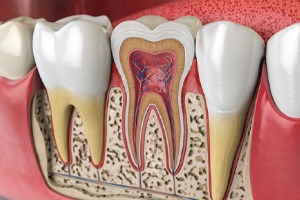Root Canal Therapy – Lewisville, TX
Tooth Pain Relief Through Restoration
 Has one of your teeth been
hurting for a while now, and the pain seems to be getting more intense? Does simply having a sip of hot coffee
or iced tea feel agonizing? In either case, it would seem you are dealing with an infection inside the dental
pulp – the bundle of nerve endings located at the center of your tooth. Since this area is so sensitive,
it can cause discomfort to the degree that it interferes with your daily life. Hope is not lost, however,
because here at Capehart Dental of Lewisville we want nothing more than to relieve your tooth pain through
restoration and give you a reason to smile once again. Contact us so we can get you back
on track with root canal therapy in Lewisville!
Has one of your teeth been
hurting for a while now, and the pain seems to be getting more intense? Does simply having a sip of hot coffee
or iced tea feel agonizing? In either case, it would seem you are dealing with an infection inside the dental
pulp – the bundle of nerve endings located at the center of your tooth. Since this area is so sensitive,
it can cause discomfort to the degree that it interferes with your daily life. Hope is not lost, however,
because here at Capehart Dental of Lewisville we want nothing more than to relieve your tooth pain through
restoration and give you a reason to smile once again. Contact us so we can get you back
on track with root canal therapy in Lewisville!
Do I Need Root Canal Therapy?

The most common indication of the need for a root canal is a severe, persistent toothache. However, that is certainly not the only symptom to look for. Other signs you might need a root canal include:
- Extreme, prolonged sensitivity to hot or cold foods or beverages
- Sharp pain when biting down
- Dark discoloration of a tooth
- Swelling or redness of the gums surrounding a tooth
- A pimple-like bump on the gums near a tooth
As soon as you notice any of these symptoms, let us know. We’ll get you in for an emergency appointment ASAP.
The Root Canal Process

The term “root canal” gets a bad rap, but this procedure is actually painless. In fact, by removing the infected nerve of the tooth, a root canal is designed to relieve pain. Plus, your restorative dentist in Lewisville will numb your mouth with a local anesthetic beforehand so you will remain comfortable throughout the process. If needed, Dr. Capehart can also utilize nitrous oxide sedation during the procedure.
We will begin by using special instruments to access the inner chambers of the tooth and remove the pulp that’s triggering your pain. After sanitizing the area, we’ll refill it with a synthetic gutta-percha material to retain the tooth’s shape. The next step is to seal and protect the tooth by placing a temporary dental crown. As your mouth heals, the area around the tooth might feel a bit sore and tender.
A few weeks later, we will see you at our dental office. Then, we’ll switch out your temporary crown for a permanent one. At that point, the underlying tooth should be fully protected. You’ll be able to use it as you normally would – bring on that cup of coffee!
The Benefits of Getting a Root Canal

While replacement options like dental implants definitely have their benefits for your smile, preserving your natural tooth should always be the primary goal. If you hesitate to get a root canal when you need one, the infection might progress to the point of no return and your tooth will have to be extracted entirely. Removing and replacing a tooth is a much more complex, time-consuming, and wallet-draining venture than root canal therapy.
In addition to saving your natural tooth, root canal therapy has other benefits:
- Virtually pain-free procedure – Thanks to the advanced dental technology we use, getting a root canal is about as comfortable as the process for an ordinary filling.
- High success rate – The vast majority of root canal patients retain their treated tooth for decades, if not the rest of their lives.
- Aesthetically pleasing results – After your root canal, your tooth will be restored with a custom-made dental crown that seamlessly blends in with the rest of your smile.
Understanding the Cost of Root Canals

The cost of root canal therapy can vary from case to case. During your consultation, we can share specific numbers with you; we strive to be candid with our pricing information so our patients do not run into any unpleasant surprises when paying for their treatment. We can also talk to you about your payment options, such as insurance and financing.
Factors That Can Affect Root Canal Cost

Some factors that can have a bearing on the cost of root canal therapy include:
- The specific tooth that requires treatment. Due to differences in anatomy and location, some teeth are more expensive to care for than others. This is often true of molars because they are larger, more challenging to reach, and can take longer to treat.
- The overall complexity of the case. We can perform most root canals right here in our office. If we must refer you to a specialist, you will need to ask them about how they price their procedures.
- Additional care. Most patients require a crown after root canal therapy. This will add to your total financial obligation.
Is It Cheaper to Pull My Tooth?

A simple tooth extraction costs less than root canal therapy. However, you should not assume that pulling a troublesome tooth is the best financial decision; you should consider the long-term value of any treatment that you choose.
If you opt to get a tooth extracted, you should get it replaced. Otherwise, you put yourself at risk of issues like dental drift and future tooth loss. The cost of an extraction plus that of tooth replacement can amount to several thousand dollars. Successful root canal therapy is a one-time cost that can preserve a damaged tooth for many years.
Does Dental Insurance Cover Root Canals?

In most cases, yes, dental insurance covers root canal therapy. Depending on your policy, it might be classified as a minor or major procedure, so it could be anywhere from 40% to 80% covered. Many patients are able to save hundreds of dollars on out-of-pocket costs by using their benefits. Our team welcomes insurance, and we are in-network with many popular plans. We can help you navigate your policy and use it in the most advantageous way possible.
Other Options for Making Root Canal Treatment Affordable

Beyond insurance, there are a few provisions that may make it easier for you to fit root canal therapy into your budget:
- CareCredit is a third-party company that provides low-interest payment plans for dental services. We can walk you through the application process.
- Capehart Care Plan. In exchange for a reasonable fee, you can enjoy preventive care at no additional cost. Plus, other services — including root canal therapy — are provided at a discount.
Would you like to learn more about root canal therapy and its cost? Our team is ready to relieve your dental pain and help you navigate the financial aspect of your treatment. Get in touch with us today to book your consultation.
Root Canal FAQs
If your tooth was recently in so much pain that you had to call your emergency dentist in Lewisville, chances are the last thing you want to hear is that you need a root canal. However, keep in mind that most of the bad things you’ve heard about root canals are just rumors and are not true. To help you prepare for your procedure, we’ve included the answers to a handful of frequently asked questions about root canal therapy below.
How Do I Know If I Need a Root Canal?
A severe toothache is the most common sign that root canal therapy is needed, but it’s not the only one. There are other symptoms to watch out for. Call our office right away if you notice any of the following:
- Sensitivity to heat and coldness that lingers after the offending object has been removed
- Darkening of the tooth or its surrounding gum tissue
- Swelling or tenderness in the nearby gums
- A pimple-like bump on the gums
- General signs of infection, such as a high fever
Will My Root Canal Be Successful?
Root canal therapy has a success rate of more than 95%. In fact, most teeth that have been treated with this procedure go on to last the rest of a patient’s lifetime.
In addition, the last step in your root canal treatment will be placing a custom-made dental crown or filling. Because these restorations are created to blend in with your smile, onlookers should not be able to tell that you even had a root canal in Lewisville.
What Can I Do to Prevent the Need for Another Root Canal in the Future?
More often than not, infections that warrant root canal therapy are the long-term result of poor oral hygiene. Fortunately, brushing twice daily and flossing every evening can go a long way toward preventing these infections. Rinsing with an antibacterial mouthwash afterward can target bacteria in areas of your mouth that your toothbrush or floss cannot access. Lastly, visiting Dr. Capehart and our team every six months for a routine checkup and cleaning will allow us to catch minor dental health issues before they spiral into larger problems that require root canal therapy.
How Much Do Root Canals Cost?
The cost of your root canal may vary based on your unique circumstances, namely the extent of your dental damage and the location of the affected tooth. Since molars contain more roots than teeth in the front of the mouth, performing a root canal on back teeth tends to take longer and cost more.
Even if a root canal seems a bit expensive, it’s worth paying for as soon as possible. Otherwise, the damage in your tooth could worsen and you may have to get it extracted and replaced, which is significantly pricier than a root canal.
On the bright side, most dental insurance providers will partially cover the cost of root canals (usually 50% to 80%). At Capehart Dental of Lewisville, we gladly accept all dental insurance plans and are in-network with many of them, including Aetna and Delta Dental. We also offer our own in-house savings plan and third-party financing through CareCredit to help you fit your root canal into your budget.
Are Root Canals Painful?
Thanks to modern dental technology, cutting-edge techniques, powerful numbing agents, and helpful aftercare instructions, the answer is “no.” So, if you have been putting off scheduling your root canal because you’re concerned that it will hurt, you don’t need to worry. In fact, our Lewisville dental team will go the extra mile to make the entire process of restoring your healthy, beautiful smile painless.
Can I Eat Before a Root Canal?
Unless instructed specifically not to, you can eat a healthy, well-balanced meal a few hours before the procedure. This is important because your mouth will still be numb after you return home, so you won’t be able to eat right away. Even after you regain sensation, you should stick to extremely soft foods until you’ve fully recovered.
Can I Take Antibiotics Instead of Getting a Root Canal?
No, antibiotics are not a suitable alternative. The reason for this is simple: these medications travel through the bloodstream, and the bloodstream cannot reach the pulp of a tooth. So, the only way to eliminate the infection (besides extracting the tooth) is root canal treatment.
What Happens if You Wait Too Long for a Root Canal?
To put it simply, the infection will only get worse. Eventually, it can progress to the point where it destroys the tooth’s nerve before spreading to your jaw, gums, surrounding teeth, or even throughout your body. For all of these reasons, we don’t recommend taking the “wait and see” approach.
Do Root Canals Make You Sick?
There are several common misconceptions about root canal treatment, including that it leads to illness. This myth stems from poorly designed research conducted by a dentist named Dr. Weston Price back in the 1920s. Although he claimed that it was better to perform an extraction because root canal treatment didn’t remove all of the bacteria in an infected tooth, his theory has been debunked on several occasions. Today, there isn’t any scientific evidence to support the claim that root canals can make you sick.
How Long Does It Take to Recover from a Root Canal?
Usually, patients feel soreness, sensitivity, and other symptoms subside around the 3-day mark. That said, how quickly you recover depends largely on how well you follow the aftercare instructions we provide. For instance, if you smoke, drink alcohol, or eat a bunch of sugary foods immediately following your procedure, there’s a chance that something bad can happen, extending the healing period significantly. If, on the other hand, you use a cold compress, don’t chew on that side of your mouth, rinse periodically with warm saltwater, and take OTC pain medication as directed, you’ll have a much smoother and quicker recovery period.
Do Root Canals Ever Need to Be Redone?
Although it’s relatively rare, there are some cases when a root canal needs to be redone. That’s why it’s so important to monitor your symptoms closely. If you start to experience considerable sensitivity, pain when biting down, or anything else of note, call us right away.
